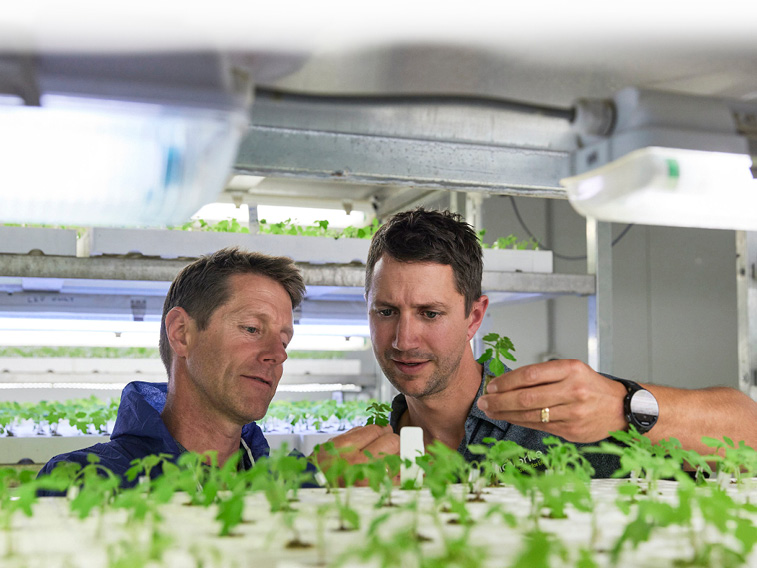The latest NAB Regional & Agribusiness webinar provides insights on the Australian & Global Economies, and a regional and rural property update. Watch the webinar here.


Twenty-nine years ago, when their first ever tomato crop was destroyed by rain and hail, Warren Nichol and Mark Millis were convinced there must be a better way.

The pair began experimenting with makeshift, plastic-covered structures – a radical move when every other commercially grown tomato in Australia was planted outdoors. It was also the first step towards an innovative method of protected cropping and a business that, today, has over 70 hectares of produce under glass.
Warren and Mark’s company, Flavorite, is now in the capable hands of their sons – CEO Mike Nichol and COO Chris Millis.
“I think our fathers would look at the business today and enjoy seeing the continuing success, particularly that the family relationships have stood the test of time,” Mike says.
Flavorite was built with a dream of growing tastier tomatoes – and an innovation mindset that continues to influence every aspect of the business.
“We’re constantly searching for ways to improve what we grow, where we grow, how we grow, how we pack, how our products taste and how they’re consumed, as well as our impact on the environment,” says Mike.
Flavorite’s list of achievements is impressive.
For instance, it was the first business in Australia to use heated glasshouses at scale to produce a year-round supply.
“As well as boosting the crop, it meant we could provide secure jobs for the community rather than the seasonal work associated with traditional farming,” Mike says. “And, as the work is all under cover, it doesn’t depend on good weather.”
A purpose-built plant nursery incorporating new technology and automation allows Flavorite to deliver new varieties, bigger plants and crops with a longer picking season. An integrated pest management system, which the company introduced to the glasshouse industry in Australia, also allows Flavorite to identify and monitor potential pest problems and use natural insect predators to control any outbreaks.
“This innovative approach reduces the need for pesticides and chemicals – and those we do use we recycle,” Mike says. “We also collect all of the rainfall from the roofs and recycle our irrigation water.”
As growing conditions affect the flavour of fruit and vegetables, every plant is carefully monitored for health, nutrition and environment.
“We’re like doctors checking the vital signs of their patients so we can act quickly to correct any problems,” Mike says.
Flavorite also developed its own in-house labour management software and hardware to optimise efficiencies.
“It’s a very intensive operation and our vigilance has paid off,” Mike says. “We can now produce 80 kilos of tomatoes per square metre compared with a typical 60 kilos elsewhere. We also invested heavily in automation right across our packing shed so we can get our produce to consumers faster for even greater freshness and quality.”
Mike and Chris have followed a strategy of controlled growth. “Once we had a proven model for tomatoes, we added capsicums, cucumbers and blueberries to the mix,” Mike says.
“We then expanded into sub-segments with particular customer appeal, such as various shapes, colours and sizes of tomatoes, cucumbers the size of your little finger and bite-size sweet mini capsicums.”
They set up their own sales and marketing team to sell directly to markets and supermarkets as they continued to expand their geographic footprint.
“Today we have four farms across regional Victoria, sell through all major supermarkets in Australia and also have a small but growing footprint in the Asian market,” Mike says.
Innovation is expensive but, as Chris points out, you can’t be a market leader without continuous investment.
“We needed a supportive bank, and NAB has been with us every step of the way,” he says. “The fact that we created our own niche made some lenders cautious, but NAB recognised from the start that we were organised, ambitious and capable. We wouldn’t be here if we didn’t have a bank that supported innovation.”
“It’s been a very important long-term relationship,” Mike adds. “NAB understands our business, challenges us, then steps back and gets out of the way to let us do what we do best.”
Mike and Chris say they took over the reins of a business set up by two forward-thinking and hard-working individuals who together made a great team.
“We consider ourselves to be very fortunate,” Mike says. “Flavorite was well led, developed with great foresight and had a strong family culture.”
Flavorite’s culture also encourages input from everyone in the organisation.
“There’s a sense of belonging that gives everyone here the confidence to speak out and know their voice will be heard,” Mike says. “Over the years, their ideas have contributed to many innovations.”
As for the future, Chris believes anything is possible.
“Who knows what we’ll be growing in five years’ time,” he says.
One thing Mike and Chris are sure of is that their fathers’ original mission will continue to shape everything they do. “We’re still committed to amplifying the flavour of the produce we grow and to do it in the most sustainable way,” Mike says.
© National Australia Bank Limited. ABN 12 004 044 937 AFSL and Australian Credit Licence 230686.